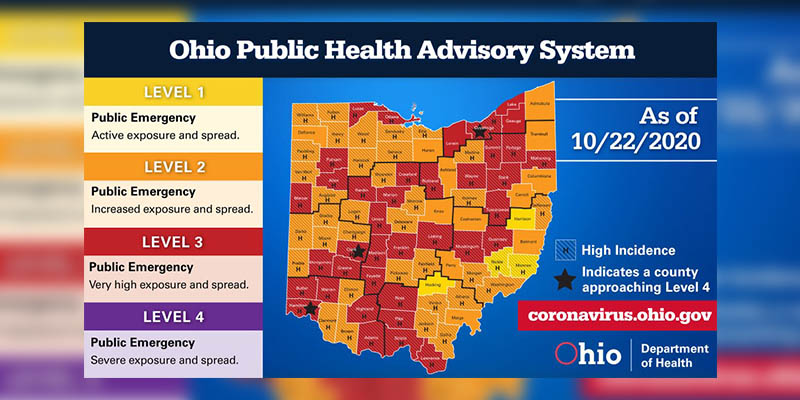
On October 22, 2020, Lake County has reached Risk Level 3, or Red Alert Level, on Ohio’s COVID-19 Public Health Advisory System. Lake County has now triggered four key indicators including:
- Indicator #1: New cases per capita (increase from 36.5 to 68.7 cases per 100,000 residents since 10/15)
- Indicator #2: Sustained increase in new cases (7.9 average cases on 10/5 to 13.3 by 10/18)
- Indicator #3: Proportion of cases not in a congregate setting (consistently exceeded 50% over past three weeks); and
- Indicator #5: Sustained increase in outpatient visits for COVID-like illness who then receive a COVID confirmed or suspected diagnosis over the last three weeks (42.4 average visits on 10/14 to 52.9 on 10/20).
Risk Level 3 indicates Lake County is experiencing high levels of exposure and spread of the virus, and residents are instructed to limit activities as much as possible. Residents should decrease their in-person interactions, consider only traveling when necessary, and limit their attendance at gatherings of any size. Facial coverings should be worn, and individuals experiencing COVID-like symptoms should stay home and consult a physician. Residents in high-risk categories must remain vigilant and continue to take extra precautions.
“The Alert System is only one piece of the puzzle in the fight against COVID-19. Going into the Red classification is a warning sign. Thankfully, hospital admissions in Lake County remain relatively low, and we’re seeing minimal spread of COVID-19 in our school buildings. That’s good news,” said Health Commissioner Ron H. Graham.
Commissioner Graham went on to say, “Older adults and people who have severe underlying medical conditions like heart, lung disease, or diabetes are at higher risk for developing more serious complications from COVID-19 illness.” Among Lake County residents, 65% of those hospitalized for COVID-19, 64% of those admitted to the Intensive Care Unit (ICU), and 97% of those who have died from COVID-19 have been 60 years or older.
As Thanksgiving rolls around, followed by Christmas, Hanukkah, and New Year’s, families and friends will likely come together from around the country. That includes college and university students, who may travel back and forth from COVID-19 hotspots. To date in Lake County, 23% of all identified COVID-19 cases have been among those the 20-29 year old age group. While severe illness is less common among this group, they are key in spreading the illness to their contacts who are more vulnerable. This is of concern as families prepare to gather for the holidays.
“I know we are all tired of the precautions necessary to prevent the spread of COVID-19 and the restrictions we have endured,” Graham stated. “It is understandable that residents want life to go back to normal, but as we approach a holiday season, now is the time to double down on social distancing, wearing face coverings, and practicing good hand hygiene. The recent spike in daily cases, which began about a week ago, is in line with what the rest of the country is experiencing, and is likely to continue to rise as we head into the holiday season. For us, as a community, to be able to keep our children in school and protect those who are most vulnerable to infection, we have to make tough decisions and sacrifice in other areas”. Even small gatherings amongst friends and family increase the risk of spreading COVID-19.
“We ask for the community’s ongoing cooperation with contact tracing and masking to help reduce the infection rate in our community and ensure that our schools, businesses, and other services may remain open.”
Commissioner Graham also encourages everyone eligible to get a flu vaccine. “Getting a flu vaccine this year is more important than ever. Flu vaccination is especially important for people who are at high risk from flu; many of whom are also at high risk for COVID-19 or serious outcomes. Avoiding the flu helps reduce additional burden on our medical system.
Visit https://coronavirus.ohio.gov/wps/portal/gov/covid-19/public-health-advisory-system to view the Public Health Advisory System. Questions regarding COVID-19 should be addressed to [email protected] or (440) 350-2188.
